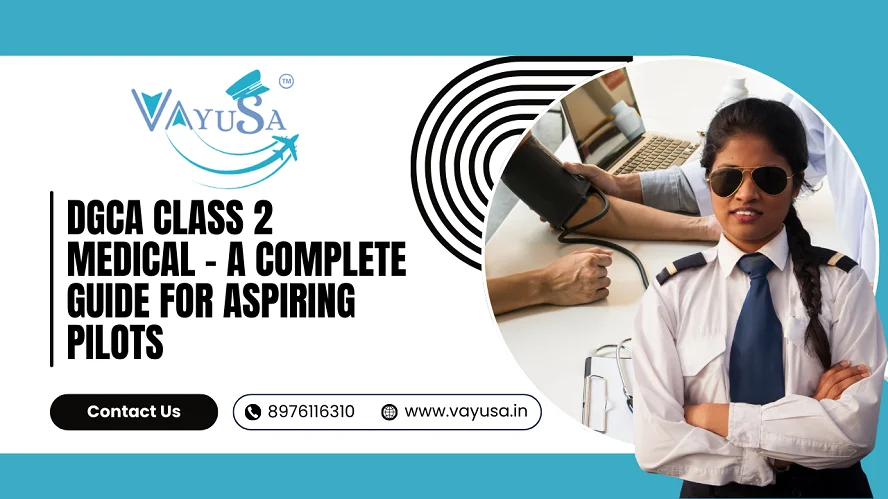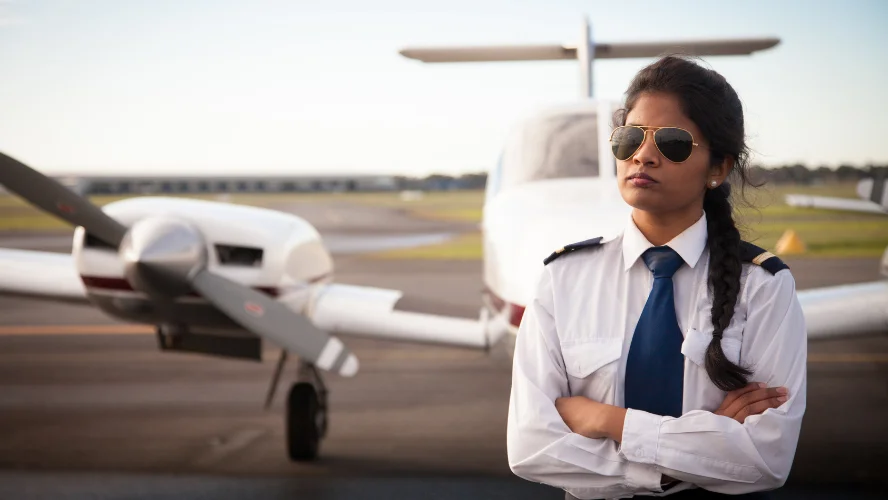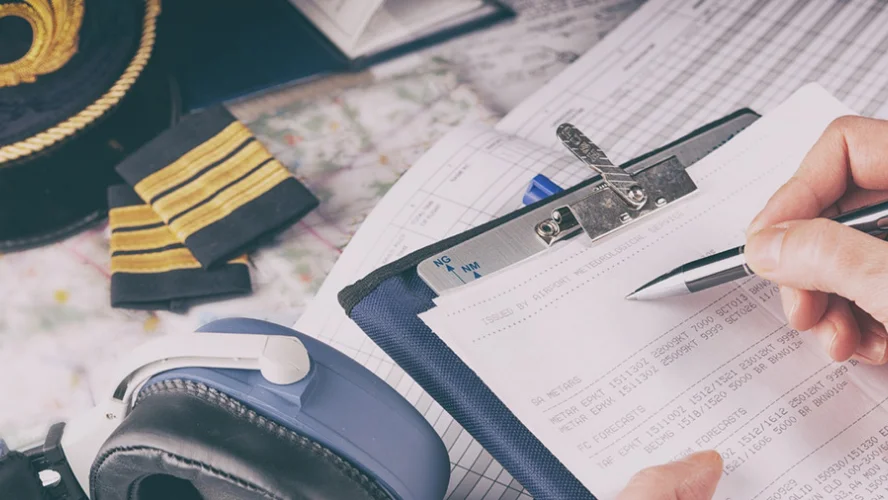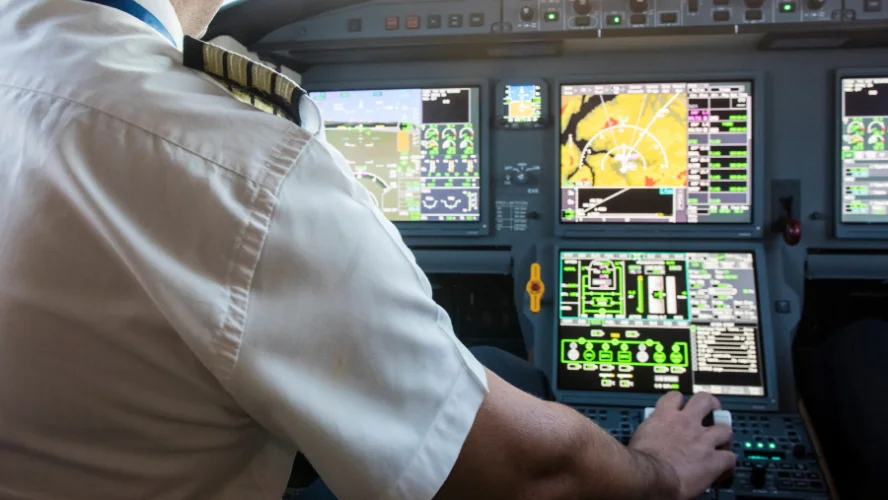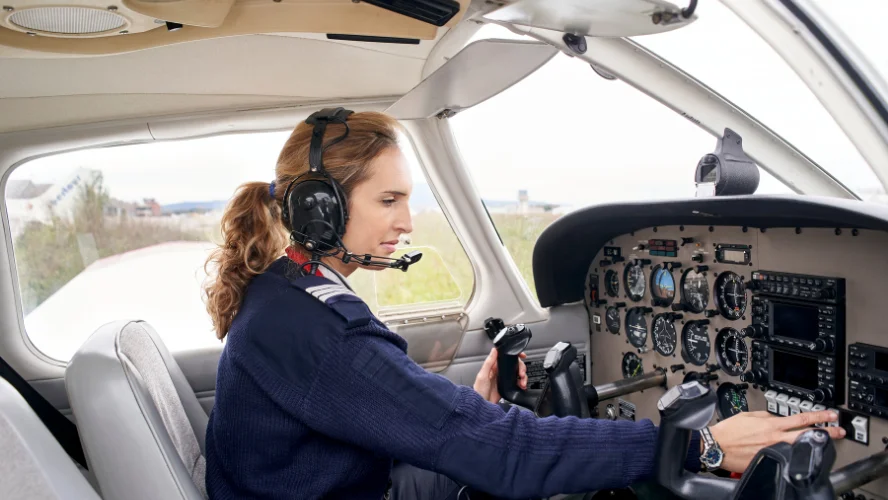The first requirement for Indian pilot candidates involves obtaining their DGCA Class 2 Medical Certificate before starting their flying career. The Directorate General of Civil Aviation (DGCA) of India requires all pilot candidates to pass medical tests, which verify their physical and mental readiness for aviation work.
This certificate acts as an entry requirement when applying for a Student Pilot License (SPL), which functions as your official authorization to begin flight training.
In this blog, we’ll provide complete information about the medical tests, documentation requirements, common mistakes to avoid, and proven strategies for passing the DGCA Class 2 medical, so you can clear it effortlessly and start your pilot training journey with confidence.
What is DGCA Class 2 Medical?
The DGCA Class 2 Medical is conducted by doctors who are on the DGCA panel. Although this is a basic medical examination that every student is required to pass before starting flight training.
In this exam test, we test your eyes, ears, heart health, mental health and physical fitness to ensure that you are in a fit condition to fly aircraft safely.
Clearing Class 2 medical fitness allows you to progress to the next stage of your flight training by getting your Student Pilot License (SPL) before you need to get the DGCA Class 1 Medical for commercial flying.
Why Class 2 Medical is the First Step for Pilot Training?
Before you begin pilot training, it’s important to grasp the basic requirements that define your aviation path. The initial and most crucial step is obtaining a Class 2 Medical Certificate.
1. Mandatory Requirement
Before you can start on your pilot career, the first prerequisite set by the Directorate General of Civil Aviation (DGCA) is obtaining a Class 2 medical certificate. This document is compulsory for every student pilot and confirms that they are physically and mentally capable of commencing flight training. Without it, no aspirant may legally join a flying school.
2. Foundation for Class 1
Another reason this step matters is that it establishes the groundwork for the more advanced Class 1 medicals required when you move on to commercial pilot training. By passing the Class 2 exam first, you demonstrate that you meet the basic health criteria, which smooths the transition to Class 1.
3. Early Issue Detection
Equally important is the fact that this medical examination in detecting possible health issues at an early stage. Whether it’s a need for vision correction, an unnoticed heart problem, or ENT-related concerns, catching these conditions promptly enables you to implement corrective actions in a timely manner.
4. DGCA File Number Generation
Finally, note that your DGCA file number is generated only after you clear the Class 2 medical. This number is a crucial part of your pilot licensing pathway, and without it you cannot proceed with further approvals or training registrations.
Now that you recognize how crucial the Class 2 Medical is for your pilot training, it’s time to gear up for the next phase. Let’s review the documents you’ll need to begin the process.
Documents Required for DGCA Class 2 Medical
You need to have these documents available when you visit for your medical examination.
- Government-issued Photo ID (Aadhaar, Passport, PAN, etc.)
- 2–3 recent passport-sized photographs
- The application form needs to be completed through the eGCA portal system.
- Medical documentation from previous treatments should be presented when you have active medical conditions.
- Spectacles prescription (if you wear glasses/contacts)
- Blood group report
You should present both physical and digital copies of your documents to make the process easier.
DGCA Class 2 Medical Tests – Explained
The DGCA Class 2 Medical includes all these medical tests, which are explained below.
1. General Physical Examination
- Height, weight, Body Mass Index (BMI)
- The medical staff will check your pulse rate and measure your blood pressure.
- The basic fitness assessment includes tests for lung function, abdominal health and neurological reflexes.
The examination verifies your overall health status to prevent any flying-related medical risks.
2. Vision Test
Good, clear vision is among the most essential requirements for pilots.
- Distant Vision – Ability to see clearly at long distances
- Near Vision – Reading ability for cockpit instruments.
- Color Vision – The Ishihara/lantern test helps detect color blindness.
- Eye Muscle Balance –The test evaluates your eye muscle function to determine if you have any squinting or misaligned eyes.
The ability to read instruments, spot runways, and perform night flights depends on having precise and clear vision.
3. ENT Examination
The ENT assessment concentrates on confirming that the examinee’s hearing, smell, and throat functions are operating correctly.
- Ear assessment to check for infections and perforations, as well as hearing function.
- Nose assessment to detect sinus problems and any nasal blockages.
- Throat assessment to check for infections and assess your tonsil condition and vocal quality.
The examination of ENT health is essential because flying operations require pressure changes that must not compromise your hearing or breathing ability.
4. Cardiology Tests
Because flying can be both physically and mentally demanding, it is essential to check heart health.
- The ECG test performs heart rhythm checks to identify any irregular heart patterns.
- The medical staff will measure your blood pressure when you are resting.
- A stress-based cardiovascular assessment will be performed when necessary.
The test verifies your heart condition to ensure it can handle flight-related stress.
5. Pathology Tests
Pathology tests cover basic urine and blood examinations.
- Blood test to detect diabetes, anaemia and infections and cholesterol levels.
- Urine test evaluates kidney function while also checking for sugar content and signs of infection.
The tests help doctors identify medical problems that could impact your long-term ability to fly.
6. Chest X-ray (if required)
In certain situations, the evaluating physician might suggest a chest X‑ray. This imaging helps identify lung conditions such as asthma, tuberculosis, or other respiratory problems. Pilots require healthy lungs because flight involves fluctuations in cabin pressure and oxygen levels. Although it isn’t required for every applicant, a chest X‑ray is recommended whenever the doctor suspects a pulmonary issue.
7. Other Investigations
Besides the routine set of examinations, the class 2 medical examiner may suggest additional investigations based on the applicant’s medical background and current health condition.
For example, a person with a history of allergies, migraines, or previous surgery might be required to undergo further assessments. These supplementary tests ensure that each candidate’s health profile is fully comprehended before granting medical clearance.
After all the tests are completed, the medical examiner reviews the results to determine whether the candidate is “Fit” or “Unfit” for a DGCA Class 2 Medical certificate. Successfully passing these evaluations is a major milestone, opening the pathway to Class 1 Medicals and ultimately a professional flying career.
For students enrolled in cadet pilot training or airline preparation classes, clearing the Class 2 Medical is often the first critical step in their aviation journey.
Approved DGCA Class 2 Examiners
The DGCA authorizes only Class 2 Medical Examiners who are doctors to perform these tests. The official DGCA website contains all necessary information about examiners including their name and address and phone number and email and expiration dates.
Always ensure:
- The examiner holds an active, valid status that has not reached its expiration date.
- You need to schedule your appointment in advance.
- You need to check if the clinic has lab facilities or if you need to obtain reports from outside sources.
Validity of DGCA Class 2 Medical
The validity of DGCA Class 2 Medical depends on the candidate’s age.
- For candidates below 40 years: Valid for 24 months
- For candidates 40 years and above: Valid for 12 months
You should monitor your expiration date because a late renewal will disrupt your training schedule.
Where to Get Your DGCA Medical Done?
DGCA‑certified examiners are located throughout India, so candidates can usually locate a convenient venue. Whether you reside in a major metropolis, a modest town, or even a semi‑urban area, there’s a good chance an examiner is close by.
For those studying in Bihar, examiners are available in Patna, Kolkata, Delhi, and several other cities.
Here are the steps you need to follow:
- Visit the official DGCA website → Personnel → Medical → Class II examiner list.
- Choose a doctor who practices near your location.
- Contact them directly to book your slot.
DGCA Class 2 Medical Cost (2025)
The medical expenses depend on the location, the quality of facilities at the clinic, and the number of additional tests required. On average:
- Basic Package: ₹2,000 – ₹3,500
The total cost for basic tests and additional tests (ECG, X-ray, labs) ranges between ₹4,000 and ₹6,000.
Check with your clinic beforehand about diagnostic test fees since they might have separate billing for these services.
Common Mistakes That Delay DGCA Medicals
Although the process is simple, numerous candidates experience delays because of preventable errors.
- One of the most common errors is visiting a doctor who is not DGCA-approved, which makes the results invalid.
- Another mistake is the lack of mandatory paperwork, ID verification, and photographs.
- Also, not reporting existing health conditions along with the relevant documentation.
- Ingesting a substantial amount of food or beverages before blood and urine tests.
- Booking appointments at the last minute causes longer wait times at the clinic.
Avoiding these typical errors can save you both time and unnecessary anxiety during the medical examination. Now, let’s explore some practical suggestions to help you clear the DGCA Class 2 Medical smoothly.
Tips to Clear DGCA Class 2 Medical Smoothly
Preparing well in advance can make your medical examination stress-free.
- Get a full night of rest before your examination day.
- You should abstain from smoking and drinking for at least 48 hours before undergoing medical tests.
- Drinking enough water will benefit your blood and urine test results.
- Carry your current prescription for glasses if you need them.
- Basic health checks at home, including blood pressure and sugar tests, will help you avoid unexpected medical issues.
- Most candidates who maintain good health will pass the exam without difficulty.
By applying these suggestions, you’ll boost your chances of acing the medical exam with confidence and ease. Once this essential stage is behind you, you’ll be a step nearer to kicking off your pilot training journey.
Final Thoughts
The DGCA Class‑2 medical isn’t just a regulatory requirement; it’s the first official checkpoint on your road to becoming a pilot. It confirms that you meet the essential health criteria needed for safe and efficient flight. With solid preparation, the right paperwork, and a clear grasp of the procedure, clearing this exam is usually a straightforward task.
At VayuSa Aviation – the leading pilot training school in Patna – we walk our students through every stage of the medical process.
Whether it’s finding DGCA‑approved physicians, assisting with paperwork, scheduling appointments, or offering preparation tips, our team makes sure you avoid any needless hold‑ups.
With VayuSa alongside you, you can concentrate on your aviation aspirations while we handle the essential steps that get you there.

